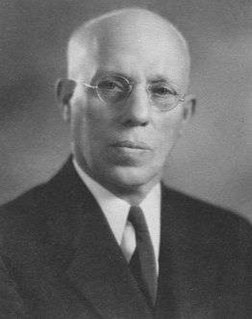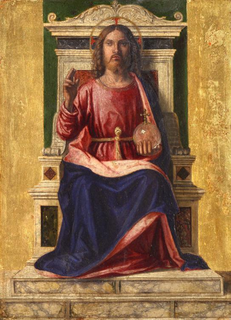
Adventism is a branch of Protestant Christianity which was started in the United States during the Second Great Awakening when Baptist preacher William Miller first publicly shared his belief that the Second Coming of Jesus Christ would occur at some point between 1843 and 1844.

Desmond Ford was an Australian theologian who studied Evangelicalism.

The Seventh-day Adventist Church had its roots in the Millerite movement of the 1830s to the 1840s, during the period of the Second Great Awakening, and was officially founded in 1863. Prominent figures in the early church included Hiram Edson, James Springer White, Joseph Bates, and J. N. Andrews. Over the ensuing decades the church expanded from its original base in New England to become an international organization. Significant developments such the reviews initiated by evangelicals Donald Barnhouse and Walter Martin, in the 20th century led to its recognition as a Christian denomination.

Criticism of the Seventh-day Adventist Church includes observations made about its teachings, structure, and practices or theological disagreements from various individuals and groups.

The 28 fundamental beliefs are the core beliefs of Seventh-day Adventist theology. Adventists are opposed to the formulation of creeds, so the 28 fundamental beliefs are considered descriptors, not prescriptors; that is, that they describe the official position of the church but are not criteria for membership. These beliefs were originally known as the 27 fundamental beliefs when adopted by the church's General Conference in 1980. An additional belief was added in 2005. The Seventh-day Adventist Bible Commentary is a significant expression of Adventist theological thought.

In Seventh-day Adventist theology, there will be an end time remnant of believers who are faithful to God. The remnant church is a visible, historical, organized body characterized by obedience to the commandments of God and the possession of a unique end-time gospel proclamation. Adventists have traditionally equated this "remnant church" with the Seventh-day Adventist denomination.

The Seventh-day Adventist Church holds a unique system of eschatological beliefs. Adventist eschatology, which is based on a historicist interpretation of prophecy, is characterised principally by the premillennial Second Coming of Christ. Traditionally, the church has taught that the Second Coming will be preceded by a global crisis with the Sabbath as a central issue. At Jesus' return, the righteous will be taken to heaven for one thousand years. After the millennium the unsaved will be punished by annihilation while the saved will live on a recreated Earth for eternity.

The theology of the Seventh-day Adventist Church resembles that of Protestant Christianity, combining elements from Lutheran, Wesleyan-Arminian, and Anabaptist branches of Protestantism. Adventists believe in the infallibility of Scripture and teach that salvation comes through faith in Jesus Christ. The 28 fundamental beliefs constitute the church's official doctrinal position.

Progressive Adventists are members of the Seventh-day Adventist Church who prefer different empheses or disagree with certain beliefs traditionally held by mainstream Adventism and officially by the church. They are often described as liberal Adventism by other Adventists, the term "progressive" is generally preferred as a self-description. This article describes terms such as evangelical Adventism, cultural Adventism, charismatic Adventism, and progressive Adventism and others, which are generally related but have distinctions.

Seventh-day Adventists Answer Questions on Doctrine is a book published by the Seventh-day Adventist Church in 1957 to help explain Adventism to conservative Protestants and Evangelicals. The book generated greater acceptance of the Adventist church within the evangelical community, where it had previously been widely regarded as a cult. However, it also proved to be one of the most controversial publications in Adventist history and the release of the book brought prolonged alienation and separation within Adventism and evangelicalism.

Milian Lauritz Andreasen, was a Seventh-day Adventist theologian, pastor and author.

The "three angels' messages" is an interpretation of the messages given by three angels in Revelation 14:6–12. The Seventh-day Adventist church teaches that these messages are given to prepare the world for the second coming of Jesus Christ, and sees them as a central part of its own mission.

Hiram Edson (1806–1882) was a pioneer of the Seventh-day Adventist Church, known for introducing the sanctuary doctrine to the church. Hiram Edson was a Millerite adventist, and became a Sabbath-keeping Adventist. Like all Millerites, Edson expected that the Second Coming of Jesus Christ would occur on October 22, 1844. This belief was based on an interpretation of the 2300 day prophecy which predicted that "the sanctuary would be cleansed" which Millerites took to mean that Christ would return on that day.

In Seventh-day Adventist theology, the heavenly sanctuary teaching asserts that many aspects of the Hebrew tabernacle or sanctuary are representative of heavenly realities. In particular, Jesus is regarded as the High Priest who provides cleansing for human sins by the sacrificial shedding of his blood. The doctrine grew out of the church's interpretation of the 1844 Great Disappointment. As a whole, it is unique to Seventh-day Adventism, although other Christians share many of the typological identifications made by the epistle to the Hebrews. One major aspect which is completely unique to Adventism is that the day of atonement is a type or foreshadowing of the investigative judgment. Technically, the "heavenly sanctuary" is an umbrella term which includes the investigative judgment, Christ's ministry in heaven before then, the understanding of Daniel 8:14, etc. However, it is often spoken of interchangeably with the investigative judgment.

Norman Hugh Young (1938—) is a Seventh-day Adventist Christian theologian and New Testament scholar. He recently retired as senior lecturer at Avondale College in New South Wales, Australia.

Edward E. Heppenstall was a leading Bible scholar and theologian of the Seventh-day Adventist Church. A 1985 questionnaire of North American Adventist lecturers revealed Heppenstall was the Adventist writer who had most influenced them.

Shut-door theology was a belief held by the Millerite group from 1844 to approximately 1854, some of whom later formed into the Seventh-day Adventist Church. It held that as William Miller had given the final call for salvation, all who did not accept his message were lost. The door of salvation was shut, hence the term "shut door". They later understood it was concerning the sanctuary and not the events on earth so abandoned their earlier understanding. As an interpretation of the year "1844", it was connected to the investigative judgment belief, which forms one of the official 28 Fundamentals beliefs today.

The Pillars of Adventism are landmark doctrines for Seventh-day Adventists; Bible doctrines that define who they are as a people of faith; doctrines that are "non-negotiables" in Adventist theology. The Seventh-day Adventist church teaches that these Pillars are needed to prepare the world for the second coming of Jesus Christ, and sees them as a central part of its own mission. Adventists teach that the Seventh-day Adventist Church doctrines were both a continuation of the reformation started in the 16th century and a movement of the end time rising from the Millerites, bringing God's final messages and warnings to a world.







